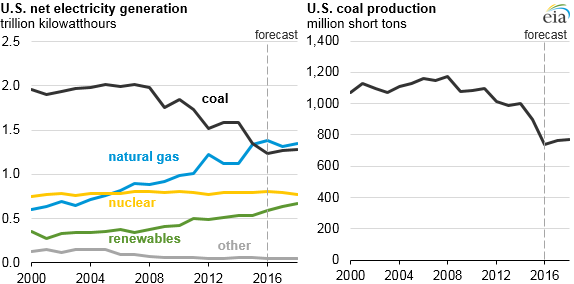Guess what? U.S. carbon emissions popped back up in a big way

For three straight years, carbon dioxide emissions in the U.S. dropped. But in 2018, emissions of the potent greenhouse gas shot back up.
A new report by the Rhodium Group — a research institution that analyzes global economic and environmental trends — found that in 2018 carbon dioxide emissions rose 3.4 percent from the prior year. That's the second largest gain in the last two decades.
This rise comes at a time when global scientists have repeatedly urged nations to ambitiously cut their carbon emissions, as rising temperatures have stoked prolonged droughts and heat waves while boosting the odds of record-breaking storms.
"It’s trending in the wrong direction — it’s not encouraging," Robert McGrath, the director of the University of Colorado Boulder's Renewable and Sustainable Energy Institute who had no role in the report but reviewed it, said in an interview.
But, McGrath emphasized, the U.S. is certainly capable of slashing its carbon appetite and transitioning to electrified transportation and renewable energies — if it wanted to.
"If we really wanted to do this, I think we could do it," he said.
Under the current administration, there's no intention of decarbonizing the nation. While the Obama administration proposed federal plans to wean the nation from carbon-intensive fossil fuels, the Trump Administration intends to kill Obama's plan and now routinely rejects elementary climate science.
The 2018 spike in carbon dioxide emissions had two main drivers. Overall, electricity demand increased by nearly 2 percent in 2018, as the U.S. economy had a good year on top of sustained recovery from the debilitating Great Recession. On top of that, fuel use — specifically from air travel and trucking — both ticked up by 3 percent.

Image: U.S. Energy Information Administration
All of this fossil fuel demand easily outpaced the gains made from the record number of U.S. coal plants shuttered in 2018. (Coal is one of the dirtiest fossil fuels).
These carbon numbers are based upon early, still-preliminary data from 2018, Kate Larsen, one of the report's authors and the former deputy director for energy and climate change in the Obama Administration's White House Council on Environmental Quality, said in an interview. But similar estimates from last year ended up proving pretty accurate, she noted.
Critically, the emissions numbers highlight that while the U.S. has gradually produced less carbon over the last decade, the nation is still far-off from meeting the ambitious climate targets agreed to at the historic 2015 UN climate negotiations in Paris. There, former President Obama declared that "the United States of America not only recognizes our role in creating this problem, we embrace our responsibility to do something about it."
SEE ALSO: 2018 takes the podium as one of the hottest years on record. Let’s look deeper.
The international goal is to limit global warming this century to 1.5 degrees Celsius (or 2.7 Fahrenheit) above pre-Industrial Revolution levels, and the U.S. — one of the top carbon emitters on the planet — plays an integral role in meeting this objective. Even before this report, however, limiting warming to 1.5 degrees Celsius was considered an immensely ambitious goal. The world has already warmed by 1 degree Celsius. Even limiting warming to 2 degrees Celsius poses a mighty challenge.
"It's increasingly difficult, but not impossible, to meet our goals," said Larsen. "But it will require a significant shift even in the next couple of years."
Getting lower
For three years running, transportation has taken the title as the top contributor of carbon emissions in the U.S. And that's not an easy problem to fix.
Simply put, there's strong demand for both air travel and trucking goods around the country.
"We’re using a tremendous amount of petroleum for transportation," said McGrath.
While many smaller cars are becoming increasingly efficient, like the Prius hybrids packed on Los Angeles freeways, it's simply not making a big dent in the overall transportation sector. When it comes to air travel for instance, many planes are more efficient, but they're burning much more fuel. We're flying more.
"It represents demand outstripping efficiency improvements," Dan Rutherford, an environmental engineer and program director for marine and aviation at the International Council on Clean Transportation, an organization that provides scientific analysis to environmental regulators, said in an interview.
Today, new planes typically don't get complete engineering overhauls, but instead are given more efficient engines, said Rutherford. This makes planes only half as efficient as they could be if they were given newer, overhauled designs, he noted.
Meanwhile, in the U.S. power sector, coal is in decline but is largely being replaced with natural gas, not renewables like wind and solar. Natural gas is certainly a significant improvement over coal and a cleaner fossil fuel, but it still creates carbon dioxide.
This is not to say renewables haven't been making historic leaps. It's just not yet nearly enough. Energy consumption from solar has increased by some 500 percent since 2010.
"Nevertheless it's still eight-tenths of a percent of total energy consumption," noted McGrath.
Here is the distribution of warmest and coldest years from the end of the animation.
As the Earth as warmed, many locations have seen the warmest years recently, while the coldest years are often more than a century ago. pic.twitter.com/EZ17NrvJ1x— Robert Rohde (@RARohde) January 6, 2019
Getting carbon emissions to trend down in a meaningful, sustained way will mean efforts in all U.S. sectors — transportation, power, industry and beyond. But in the end, the 2018 carbon numbers shouldn't be too unexpected. Political leadership in the nation — candidly conveyed by both the Environmental Protection Agency (EPA) and the Trump administration — is not concerned about the planet's globally disrupted climate.
As consequence, there's not a concerted federal effort to combat climate change by decarbonizing the economy. At least, not yet.
"I think the 2018 emissions are disappointing, but it's not very surprising," said McGrath.
WATCH: Ever wonder how the universe might end?


